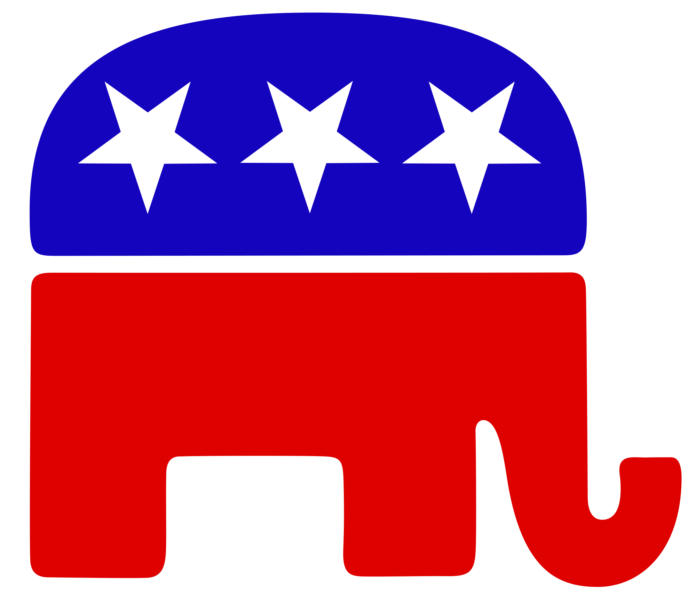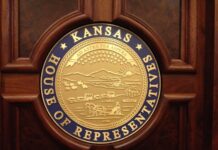(Updated to reflect Sunday post from prominent Kansas conservative blogger criticizing the party’s decision)
Kansas Republicans decided Saturday not to hold a presidential caucus next year when President Donald Trump will face challenges from within his own party.
Party officials say the decision – hotly criticized by some as rigging the process in favor of Trump – is tied to historical precedent dating back to Abraham Lincoln and the fact that caucuses are costly and consume a lot of volunteer hours.
They said caucuses have not been held in years when the party had an elected incumbent president, with 1992 being a notable exception when a state-financed primary was held the year President George H.W. Bush ran for re-election.
Every time an elected GOP incumbent has run for re-election – except 1912 – the party adopted a resolution instructing all delegates to vote for the incumbent.
Mike Kuckelman, chair of the Kansas Republican Party, pushed back against the idea that only Trump would be eligible to receive delegates from the state heading into the GOP’s national nominating convention next year.
He said the rules passed by the party allow delegates at the party’s conventions in each of the four congressional district to nominate someone so long as they’re filed with the Federal Election Commission and they’re actively campaigning. The same situation could happen at the party’s statewide convention as well, he said.
Each convention is required to adopt a resolution naming the candidate to whom all its delegates are bound. A majority of votes is required to pass the resolution.
“Somebody could lobby at that convention for the delegates to be bound to them,” Kuckelman said. “At any convention (the delegates) could pick whoever they want as long they’re registered to run for the office and are actively campaigning.
“Some people are getting wound up – more out of not understanding the process – than they should be,” Kuckelman said.
Kuckelman noted that the caucuses could cost about $250,000 and divert volunteers away from working to get Republicans elected.
“It’s a party issue, not a public issue,” he said.
Trump has two Republican challengers, former Congressman Joe Walsh and former Massachusetts Gov. William Weld. But the GOP in Kansas and three others states is scrapping primaries or caucuses that could help Trump’s challengers.
The GOP has taken heat since the party’s plans went public Friday with critics contending that Republicans are trying to skew the primary season to favor of Trump.
In Kansas, social media was hot with critics, some of them Democrats, ripping the GOP for trying to suppress its own voters. Democrats used the occasion on social media to invite disenchanted Republicans to leave their party.
“What an embarrassing display of anti-democratic cultism. No matter how you spin this, it’s a very bad look for the Kansas GOP,” wrote one on twitter.
Said another self-proclaimed Republican on Twitter, “And here I thought Kansas Republicans were the pragmatic, traditional conservatives kind. Currently, I’m a JoCo Republican but I’m guessing not for long. Do you even want moderates to remain in the party.”
Political commentator Bob Weeks of Wichita, who advocates for individual freedom, limited government and free markets, criticized the party’s decision on Sunday in a post on his website, Voice for Liberty.
“Kansas Republicans should have either a caucus or a primarily election,” Weeks wrote. “To have neither, simply because the incumbent president is a Republican, deprives members of the Kansas GOP of a chance to make a decision.
“Yes, President Trump is popular with Republicans, very much so. But not everyone agrees. There are Republicans, myself included, who would prefer someone else than Donald Trump as the party’s nominee,” he wrote. “For the Kansas Republican Party to assume that Trump would win the caucus or primary smacks of elitism.”
Kuckelman conceded that a caucus would draw from a much larger pool of Republican voters than the 200 or so delegates who will make the decision at the local and state conventions.
“All the Republicans vote for their delegates,” he said. “It’s representative form of government. A Republican in the 3rd (congressional) District votes for the delegates and those delegates are the ones that are voting on how we handle the national convention in terms of who the delegates in the 3rd District will be bound too.”
If Republicans don’t like the way a delegate votes, they can vote them out of that position, Kuckelman said.
“The people who go to these meetings that are delegates represent a large number of Republicans. They’re elected to do that,” he said. “Next time around, don’t let them be a delegate.”
















